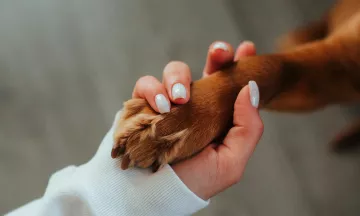Cats are wonderfully adventurous critters. This also means that they aren't afraid of risks. To protect your cat against accidents, poisoning or other illness, it's really important to take some safety measures around the home. Fortunately, with this checklist, you can make your cat's life a lot healthier and safer.
Protect your cat against poisoning
Cats naturally have an instinct for avoiding toxins, however, domestic cats can accidentally ingest dangerous plants or chemicals. Normal substances that you just have lying around at home but that can be life-threatening for your cat.
Dangers at home:
- Cleaning products
- Alcohol
- Medicines
- Toxic houseplants
- Fragile items that shatter or splinter
- Small toys, craft supplies
- Toiletries such as earplugs or dental floss
- Human foods: feed your cat proper cat food
In the shed:
- Paint & glue
- Chemicals
- Pesticides
Also, watch out for heat sources such as candles, fireplaces, heaters or gas stoves.
[[{"type": "media", "view_mode": "media_large", "fid ":" 7234609 "," attributes ": {" alt ":" cat changes plant "," class ":" media-image "," typeof ":" foaf: Image "}}]] Throw cats like to break things - and love plants!
Protect your valuables
Do you leave your cat alone in the house? Then make sure to hide valuable items such as telephone cords, electronics, fragile decorations and artwork, nice shoes and other attractive 'toys'. Cats (especially kittens) like to play with human stuff and strangely they just love to knock things over or off high surfaces...
If you have a cat sitter coming over, it's important to make arrangements with the sitter not only about your cat but also about your house and your stuff. You can also place your valuable items in a separate, closed room. That way you don't run any risks while you are away.
Don't punish, but distract
It's important not to punish the cat for dangerous/undesirable behaviour but instead distract towards other behaviours. When your cat does something dangerous or undesirable, clearly say 'no' and take your cat away from the danger, and possibly offer them a cat-friendly alternative (such as a toy, cat treats or cat grass)
Cat just like to hide
Cats like to retreat to a comfy place (especially during the day) to take a nap. They might hide in a closet, a quiet room, a pile of clothes, under the bed or even in the washing machine. They are so good at hiding that sometimes we just don't know where they are! That's why it's important to always check where your cat is before you leave the house: make sure you didn't accidentally lock the cat up in a closet or room and that they didn't slip out when you opened the door to leave. And absolutely always check the washing machine before turning it on.
[[{"type": "media", "view_mode": "media_large", "fid": "7234618", "attributes": {"alt": "cat hidden in box", "class": "media-image", "typeof": "foaf: Image"}}]]
The risk of traffic
Traffic is a serious risk factor for cats. It's really strongly encouraged by most cat welfare organisations for cat owners like to keep their cat inside or in an enclosed outdoor space for this very reason (as well as many, many others). It can be tricky in practice and some cats might find a way of sneaking out of the house. Therefore, always check all windows, doors and windows and make absolutely sure your cat doesn't follow you when you leave the house. If you want to give your cat outside access, consider covering your garden with gauze or purchasing an outdoor cat enclosure. Read more about the dilemma: an indoor cat or outdoor cat?
Even if you have an indoor cat, it's important that your cat is microchipped and registered. Also, make sure you have clear photos and a detailed description of your cat in case they do go missing.
Note: it is understandable to want to keep your cat inside. However, it's important to always provide sufficient indoor challenges with toys, climbing furniture and exercise. If you're too busy with work or on a holiday, you can book a loving cat sitter in your area that will visit your cat once or twice a day and extra give attention and playtime.
Make sure your cat sitter is prepared
Go on holiday and booking a cat sitter from Pawshake? Then make sure to share the details of your veterinarian, your cat's medical history and an emergency phone number from a friend or neighbour with your cat sitter. If an emergency occurs, your pet sitter will know exactly what to do. Read more about when to take your pet to the vet.
In case of emergency
Has an accident happened anyway and is your cat unwell? First, always contact the veterinarian and, if necessary, perform first aid on your cat. If you are a cat sitter on Pawshake, it is important to inform the cat owner immediately and also reach out to Pawshake customer service. They can advise and support you through.
Insurance or savings for your cat?
During every Pawshake booking, your is pet automatically covered against accidents and illness with Pawshake Insurance. This provides extra security if your cat suddenly becomes ill or has an accident during the booking. But of course, you can be confronted with costs in day-to-day life, for example, if your cat develops a chronic illness or needs surgery at some point.
Always think about whether you can bear these financial risks and make a plan. Take unexpected costs into account by creating a piggy bank for your cat, or if it suits you better, take out pet insurance for your cat.
No need to stress
It's important to protect your cat, but we have to make sure our domestic tigers are free enough to do their thing. A cat discovers the world by taking risks, so let them play, move, explore and discover. By jumping, hunting and playing, your cat's brain is stimulated and muscles and joints are kept healthy. So keep an eye on things, but let them really be a 'cat'. Your pet will thank you for it!





